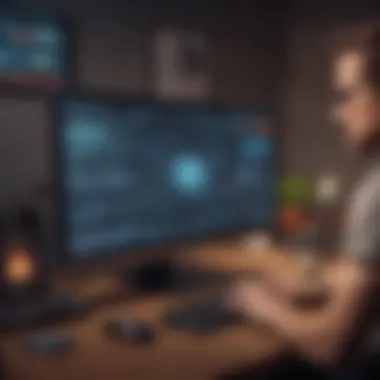Unlocking the Potential: A Guide to Becoming a Home-Based Game Tester


Tech Trend Analysis
In the realm of gaming, one prevailing trend shaping the industry is the increasing demand for remote game testing. With advancements in technology enabling seamless connectivity, more game development companies are embracing the concept of allowing testers to work from home. This trend not only enhances flexibility for both testers and companies but also opens doors for a more diverse pool of talent to contribute to game development. As consumers seek more personalized and polished gaming experiences, the shift towards remote game testing reflects a commitment to ensuring high-quality products that meet evolving market expectations.
While the traditional image of a game tester may involve a physical office setting, the reality is that many opportunities now exist for individuals to test games from the comfort of their own homes. This shift has been facilitated by technological advancements that enable comprehensive testing to be conducted remotely. Aspiring game testers no longer need to be tied to a specific location to pursue their passion; instead, they can leverage their skills and expertise from anywhere in the world. However, despite the convenience of testing games from home, this career path comes with its own set of unique challenges and requirements that individuals must be prepared to navigate.
Skills and Requirements
To excel as a remote game tester, certain skills and requirements are essential. Beyond a genuine passion for gaming, testers must possess a keen eye for detail, exceptional communication skills, and the ability to provide constructive feedback. Technical proficiency, familiarity with various gaming platforms, and the capacity to adapt to different game genres are also crucial for success in this role. Additionally, being able to work independently, meet deadlines, and effectively collaborate with development teams are key attributes that can set remote game testers apart in a competitive industry.
Challenges and Opportunities
Despite the allure of working as a game tester from home, there are inherent challenges that individuals may encounter along the way. From managing time effectively to maintaining focus and productivity in a home environment, testers must navigate potential distractions to ensure their work meets high standards. Furthermore, competition in the field of game testing can be fierce, requiring individuals to continuously hone their skills and stay updated on industry trends to remain relevant. However, amidst these challenges lie numerous opportunities for growth and career advancement. By demonstrating dedication, professionalism, and a commitment to delivering quality feedback, remote game testers can carve out a rewarding career path in the dynamic and ever-evolving gaming industry.
Conclusion
Introduction
In the sprawling realm of the gaming industry, the role of a game tester holds a significant position, often serving as the unsung hero behind the scenes of game development. This article delves deep into the intriguing landscape of becoming a game tester from the comfort of one's home. By unraveling the requirements, skills, challenges, and prospects associated with this profession, we aim to shed light on the nuanced world of game testing.
Understanding the Role of a Game Tester
Responsibilities of a Game Tester
The core responsibility of a game tester is to meticulously assess games, hunting for bugs, glitches, and inconsistencies to ensure a seamless gaming experience. These diligent individuals play a pivotal role in enhancing the quality of games before they reach the hands of eager gamers. The demanding yet rewarding nature of this role appeals to those with a keen eye for detail and a passion for unraveling the intricacies of game mechanics. While the relentless pursuit of flaws can be arduous, the satisfaction of contributing to polished game products outweighs the challenges.
Importance of Game Testing
Game testing stands as a crucial phase in the game development process, acting as the final frontier between a flawless gaming experience and a buggy disaster. The meticulous eye of a game tester not only ensures functional gameplay but also enhances the overall immersive quality of games, amplifying user satisfaction. Emphasizing the significance of game testing in refining games to perfection, this aspect of the gaming industry offers a promising career path for individuals attuned to the nuances of digital entertainment.
Transitioning to Remote Game Testing


Advantages of Remote Game Testing
The advent of remote game testing introduces a paradigm shift in the game testing landscape, offering unprecedented flexibility and accessibility to aspiring game testers. Embracing remote game testing allows individuals to contribute to the industry from the comfort of their homes, eliminating geographical limitations and fostering a diverse talent pool. The ability to work in familiar environments while engaging in a dynamic industry underscores the allure of remote game testing.
Challenges of Remote Game Testing
Despite the allure of remote game testing, challenges such as communication barriers, timezone differences, and technological constraints can pose hurdles for testers. Navigating through these obstacles demands adaptability, strong communication skills, and a proactive approach to problem-solving. Overcoming these challenges is essential for remote game testers to thrive in a virtual work environment and deliver quality results amidst varying constraints.
Key Requirements for Remote Game Testers
Technical Skills
Being adept in utilizing a diverse range of gaming platforms, understanding software development processes, and possessing proficiency in bug tracking tools are essential technical skills for remote game testers. The ability to navigate through intricate game systems and effectively communicate technical issues is paramount in ensuring the smooth functioning of games. Possessing a robust technical skill set equips remote game testers to efficiently identify and rectify defects, contributing to the overall quality of game products.
Attention to Detail
Remote game testers must exhibit exceptional attention to detail, meticulously combing through game elements to uncover elusive bugs that could impact the user experience. The ability to identify minor anomalies and inconsistencies requires a sharp eye and a systematic approach to testing. Cultivating a keen attention to detail not only enhances the thoroughness of testing procedures but also demonstrates a commitment to delivering superior gaming experiences.
Getting Started as a Remote Game Tester
In the vast realm of remote game testing, the section on 'Getting Started as a Remote Game Tester' serves as the foundational step towards a promising career. Delving into the intricacies of this topic is essential, as it sheds light on the initial stages of embarking on this remote profession. From understanding the dynamics of game testing to exploring the various opportunities that exist in the market, this section plays a crucial role in setting the right trajectory for aspiring remote game testers.
Exploring Job Opportunities
Freelancing Platforms
When it comes to 'Freelancing Platforms' in the realm of remote game testing, one cannot overlook the integral role they play. Freelancing platforms provide a fertile ground for skilled individuals to showcase their expertise to a global audience. The key characteristic of freelancing platforms lies in their versatility and accessibility, offering a wide array of projects to cater to different skill levels. Utilizing freelancing platforms can be a beneficial choice for remote game testers, as they open doors to a plethora of opportunities while allowing for a flexible work schedule. Despite such advantages, freelancing platforms may come with certain drawbacks such as intense competition and varying payment structures, factors to be mindful of in the pursuit of remote game testing.
Game Development Companies
In the domain of remote game testing, 'Game Development Companies' serve as pillars of innovation and creativity. Engaging with game development companies can offer remote game testers a direct insight into the industry's workings. The key characteristic of game development companies is their commitment to crafting immersive gaming experiences, making them a popular choice for testers seeking hands-on involvement in the gaming process. Collaborating with game development companies comes with advantages such as exposure to cutting-edge technologies and potential career growth. However, it is important to note that navigating within such a structured environment may pose challenges like stringent quality standards and project timelines.
Building a Strong Portfolio


The significance of 'Building a Strong Portfolio' as a remote game tester cannot be overstated. Your portfolio acts as a representation of your skills, expertise, and experience in the gaming industry. Showcasing skills effectively in your portfolio is vital to attract potential clients or employers. The key characteristic of a strong portfolio lies in its ability to highlight your strengths and showcase projects that demonstrate your proficiency in game testing. A well-crafted portfolio can be a powerful tool for remote game testers, enabling them to stand out in a competitive market. While there are numerous benefits to building a strong portfolio, including increased visibility and credibility, this process may also pose challenges such as the need for consistent self-promotion and portfolio updates.
Networking in the Industry
When it comes to 'Networking in the Industry' as a remote game tester, forging meaningful connections can open doors to valuable opportunities. Networking allows you to engage with industry professionals, potential clients, and like-minded individuals within the gaming sphere. The key characteristic of networking lies in its potential to create collaborative partnerships and access insider information. Engaging in networking activities can be a beneficial choice for remote game testers, providing avenues for career growth and skill enhancement. Despite the advantages of networking, challenges such as time constraints and the need for effective communication skills may arise, factors to be mindful of during the networking process.
Demonstrating Proficiency in Game Testing
Demonstrating proficiency in game testing is paramount for remote game testers aiming to excel in their craft. 'Test Cases Creation' plays a crucial role in this demonstration, as it involves developing detailed test scenarios to evaluate game functionality. The key characteristic of test cases creation is its ability to systematically assess various aspects of a game, ensuring comprehensive testing coverage. This method is a beneficial choice for remote game testers as it enhances the efficiency and effectiveness of the testing process. While test cases creation offers advantages such as thorough bug detection and streamlined testing procedures, challenges like time-consuming test case development and scalability issues may be encountered.
Bug Reporting
In the realm of game testing, 'Bug Reporting' serves as a fundamental aspect of quality assurance. Effectively documenting and communicating bugs discovered during testing is essential for maintaining game integrity. The key characteristic of bug reporting lies in its role in fostering clear communication between testers and development teams. Engaging in bug reporting can be beneficial for remote game testers as it ensures the seamless resolution of issues and the enhancement of overall game performance. Despite its advantages in improving game quality, bug reporting may present challenges such as identifying and replicating elusive bugs and managing a high volume of reported issues.
Thriving as a Remote Game Tester
As a remote game tester, thriving in this role is crucial for long-term success and professional growth. It requires a combination of continuous learning, effective communication, and adept workload management. Embracing the dynamic nature of the gaming industry and honing one's skills are central to thriving in this competitive field. Remote game testers must adapt to changing trends and technologies to stay relevant and provide valuable insights to development teams.
Continuous Learning and Skill Development
Staying Updated with Industry Trends:
Staying updated with industry trends is a pivotal aspect of remote game testing. By staying informed about the latest technologies, gaming platforms, and market demands, testers can enhance their testing strategies and approaches. This proactive approach ensures that testers remain competitive in the field and can identify emerging opportunities for professional advancement. However, staying updated also requires discernment to filter valuable information from the noise prevalent in the gaming industry.
Participating in Training Programs:
Engaging in training programs is a valuable investment for remote game testers. These programs offer opportunities to refine existing skills, acquire new testing methodologies, and stay abreast of industry best practices. Participating in such programs not only enhances individual competence but also contributes to the overall efficiency and quality of game testing processes. However, selecting relevant and reputable training programs is essential to derive maximum benefit and avoid wasted time and resources.
Maintaining Communication with Development Teams
Effective Feedback:


Providing effective feedback is essential for promoting collaboration and driving improvements in game development. By offering clear, constructive feedback, remote game testers can help developers identify and rectify issues efficiently. Effective feedback fosters a culture of continuous improvement and ensures that the final game product meets quality standards and user expectations. However, delivering feedback tactfully and diplomatically is vital to building positive working relationships with development teams.
Collaborative Approach:
Embracing a collaborative approach enhances the efficiency and effectiveness of remote game testing. By working closely with developers, testers can gather valuable insights, address complex issues, and streamline the testing process. Collaboration encourages knowledge sharing, mutual respect, and innovation within the development team. However, maintaining a balance between independence and collaboration is essential to prevent potential conflicts or dependencies.
Balancing Workloads and Deadlines
Time Management Skills:
Mastering time management skills is indispensable for remote game testers facing diverse tasks and deadlines. Effectively allocating time for testing, bug reporting, and communication ensures optimal productivity and timely project delivery. Good time management enables testers to prioritize tasks, mitigate delays, and maintain a consistent workflow. However, striking a balance between efficiency and thoroughness is crucial to avoid rushed testing or overlooked issues.
Prioritization Techniques:
Employing prioritization techniques is key to managing workload complexities and meeting project deadlines. Testers must assess task criticality, dependencies, and resource availability to prioritize activities effectively. By focusing on high-impact tasks first, testers can maximize productivity and ensure timely delivery of quality test results. However, adapting prioritization strategies to project requirements and team dynamics is essential to avoid bottlenecks or overlooked priorities.
Conclusion
In the realm of remote game testing, the conclusion serves as a pivotal point encapsulating the essence of this evolving industry. As technology continues to advance, the demand for proficient game testers working remotely is on the rise. This segment explores the trajectory of remote game testing, shedding light on the significance of adapting to a virtual work environment. By considering the challenges, opportunities, and required skill set, individuals aspiring to venture into this field can grasp the dynamics and nuances of this sought-after profession.
The Future of Remote Game Testing
Industry Projections
Delving into the intricacies of industry projections within the context of remote game testing reveals a landscape ripe with innovation and growth. The foresight provided by industry projections equips professionals with valuable insights into trends, demands, and emerging technologies. This foresight not only facilitates strategic decision-making but also empowers individuals to align their skill set with the evolving needs of the gaming industry. Embracing industry projections as a guiding beacon ensures that remote game testers stay ahead of the curve, adapting to industry shifts seamlessly.
Evolution of Game Testing
The evolution of game testing serves as a cornerstone in understanding the transformative journey of this discipline. From traditional methods to the incorporation of artificial intelligence and automation, the evolution underscores the adaptability and resilience required in the realm of game testing. Embracing this evolution fosters a culture of continuous learning and innovation, propelling remote game testers towards enhancing efficiency and efficacy. By recognizing the evolution as a catalyst for progress, professionals can chart a course towards sustained relevance in a dynamic industry landscape.
Final Thoughts
Opportunities in Remote Game Testing
Unveiling the array of opportunities within remote game testing unveils a realm brimming with possibilities for growth and advancement. Remote game testers have the chance to engage with diverse projects, collaborate with industry-leading professionals, and contribute significantly to the development of cutting-edge games. The flexibility and autonomy afforded in remote game testing opportunities elevate the potential for career satisfaction and fulfillment, making this field an attractive option for those seeking a blend of creativity and technical expertise.
Continuous Growth Potential
Exploring the sphere of continuous growth potential in remote game testing illuminates a trajectory marked by perpetual learning and advancement. The dynamic nature of the gaming industry ensures that opportunities for growth and development are abundant for remote game testers committed to honing their skills and expanding their horizons. By embracing a mindset of continual improvement and professional development, individuals can unlock a myriad of prospects for career progression and success within the realm of remote game testing.



